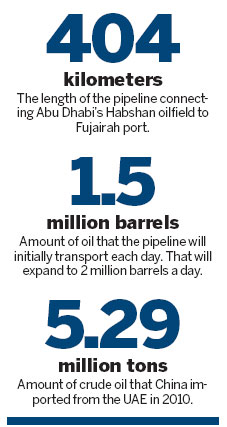Oil pipes to bypass Strait of Hormuz
Updated: 2012-01-17 08:31
By Zhou Yan (China Daily)
|
||||||||

Conduit for exports mainly from UAE could start operation as early as May
ABU DHABI - The strategic Abu Dhabi Crude Oil Pipeline, which will bypass the Strait of Hormuz, could be put into operation as early as May.
The pipeline, in which a subsidiary of China National Petroleum Corp (CNPC) serves as the engineering, procurement and construction (EPC) contractor, is almost complete and requires only three additional months to file the finishing documents, the sources said.
The 404-kilometer pipeline connecting Abu Dhabi's Habshan oilfield to Fujairah port, will be able to transport 1.5 million barrels a day initially and will expand to 2 million barrels a day as project proceeds.
The deadline for the project was delayed from April 2011 to this May at earliest. "It's a technical delay, as a lot of materials have to be compiled before operation, despite the growing tensions between Iran and the West, " one source said.
Mohamed al-Hamli, oil minister of the United Arab Emirates, said this month that the pipeline will begin operation by the middle of 2012.
The strategic importance of the pipeline has been greatly elevated since Iran threatened to block the Strait of Hormuz, through which about one-fifth of the global crude oil supply flows, or 17 millions barrels a day, in the event of tougher Western sanctions against Iran oil exports.
The pipeline, which is capable of transporting the majority of the UAE daily output, will help the country mitigate risks from the possible disruptions of the strait.
The tension between Iran and the United States and Europe has also posed a threat to energy security in China, which imports about 40 percent of its crude oil from Saudi Arabia, Iran, and Oman, which rely on the strait to export crude.
Consequently, China has to diversify its foreign oil sources to safeguard its supply and reduce heavy dependence on Iran, said Song Zhichen, an energy analyst at China Investment Consulting.
In addition, politically stable countries such as the UAE are widely expected by analysts to become more important to China to expand its oil import sources. Premier Wen Jiabao started his first state visit to the UAE on Monday to enhance bilateral ties between the two nations.
Industry sources told China Daily that China is also in talks with Abu Dhabi to increase its annual crude oil imports from the Middle Eastern country. Figures from the customs authority showed that China imported 5.29 million tons of crude oil from the UAE in 2010.
CNPC, China's biggest oil producer, said in July that it had entered agreement with Abu Dhabi National Oil Co to increase oil supplies from Abu Dhabi, the major oil exporter in the UAE, starting in 2014 - no figures were mentioned.
In addition, CNPC may discuss a deal with the corresponding parties in the UAE to participate in exploring oil blocks in Abu Dhabi. If feasible, it will become CNPC's first upstream exploration project in the country.
China Daily
(China Daily 01/17/2012 page3)

 Relief reaches isolated village
Relief reaches isolated village
 Rainfall poses new threats to quake-hit region
Rainfall poses new threats to quake-hit region
 Funerals begin for Boston bombing victims
Funerals begin for Boston bombing victims
 Quake takeaway from China's Air Force
Quake takeaway from China's Air Force
 Obama celebrates young inventors at science fair
Obama celebrates young inventors at science fair
 Earth Day marked around the world
Earth Day marked around the world
 Volunteer team helping students find sense of normalcy
Volunteer team helping students find sense of normalcy
 Ethnic groups quick to join rescue efforts
Ethnic groups quick to join rescue efforts
Most Viewed
Editor's Picks

|

|

|

|

|

|
Today's Top News
Health new priority for quake zone
Xi meets US top military officer
Japan's boats driven out of Diaoyu
China mulls online shopping legislation
Bird flu death toll rises to 22
Putin appoints new ambassador to China
Japanese ships blocked from Diaoyu Islands
Inspired by Guan, more Chinese pick up golf
US Weekly

|

|






